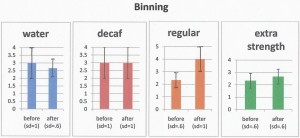College students are closely related to energy drinks. Every night we see students with serious faces, laptops, and 5 hour energies. It seems quite useful. What happens after drinking 5 hour energy? Are there side effects?
First, in general, we know energy drinks contain plenty of caffeine, sugar, and other chemicals. And we are scared by sensational news like Caffeinated Drink Cited in Reports of 13 Deaths. And we continue to drink and get good grades. What is really going on??????
This study conducted by Marczinski Cecile raises meaningful points. “Participants (n=14) completed a three-session study where they received the energy shot, a placebo control, and no drink. Following dose administration, participants completed subjective Profile of Mood States ratings hourly for 6 hours. Participants also repeatedly completed a behavioral control task (the cued go/no-go task) and provided blood pressure and pulse rate readings at each hour. The results turns out that consumption of the energy shot did improve subjective state, as measured by increased ratings of vigor and decreased ratings of fatigue. However, the energy shot did not alter objective performance, which worsened over time. Importantly, the energy shot elevated both systolic and diastolic blood pressure.”
The study is designed perfectly. The double blinded trial with placebo control shows the most direct effects of the energy drink. However, the sample size of 14 is too small to rule out the possibility of happening by chance. So I find another study conducted by David Apotov to further confirm the results.
David predicts that the energy drinks will have effects on blood pressure, heart rate, heart rhythm irregularity, and brain activity. Involved more than 100 participants, David also conducted double blinded trial with placebo control, and he got the following results.
The charts are quite clear. With no doubts,
the regular 5- Hour Energy drink showed a trend towards a significant increase in systolic blood pressure and a trend towards a significant increase in heart rhythm irregularity energy drinks do something to hour body which may be potential risks of our health. The companies always claims that a regular amount will not hurt. However, who can define regular for everyone. And with true stories like this one: Anais Fournier, 14-Year-Old Girl, Dies After Drinking 2 Energy Drink. We have to reconsider should we continue to drink energy drinks.
Using the risk measurement method in Andrew’s class, we may get the answer that it is less possible to die from energy drinks than marry Kim Kardashian. However, health problems can be progressive. It is different from car crash. It is true that only 1 in a million people die from energy drinks, but if we count the number of people who have bad body reaction after drinking five our energy, will that be 9 in 10? At least people will get dizzy after more than 20 hours awake.
As for my personal opinion. I do not recommend energy drinks. First, there must be some side effects, and I think everyone knows that. But humans always assume themselves are the lucky ones, so they overlook those implicit potential risk to their health. And second, no matter what is inside the little bottle, it didn’t give you real energy. 5 year energy only stimulates you to stay up and consume your own energy. Where the extra energy comes from? Can we avoid making up for overconsumption of our own energy? Most of us can easily get the answers. But ignores them and keep hurting our own bodies. Stop that, try to be responsible to your health!!














